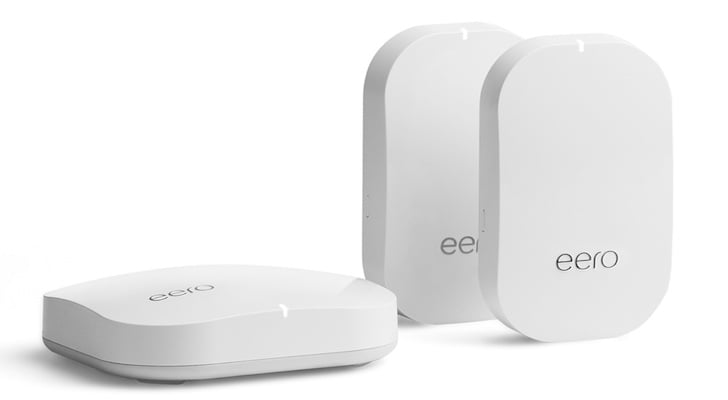Amazon (NASDAQ:AMZN) is already the connected smart home leader, thanks to its Echo smart speakers and accessories like its Cloud Cam security cameras and Ring doorbell cams. But now the company is going after the “connected” part of the equation. Yesterday evening, AMZN announced that it is buying Eero, a startup that helped to kick off the popularity of mesh Wi-Fi routers.
So, what does this acquisition mean for both Amazon and Eero?
Amazon Announces Eero Acquisition
Just an hour after markets closed on Monday, Amazon sent out a press release announcing it had signed an agreement to acquire Eero, a startup that makes mesh Wi-Fi routers. Founded in 2014, San Francisco-based Eero was first to market with a mesh Wi-Fi system for the home.
AMZN’s SVP of Amazon Devices and Services had this to say:
“We are incredibly impressed with the eero team and how quickly they invented a WiFi solution that makes connected devices just work. We have a shared vision that the smart home experience can get even easier, and we’re committed to continue innovating on behalf of customers.”
Terms of the acquisition were not disclosed.
Why Buy a Router company … And Why Eero?
For Amazon, buying Eero solidifies its position as a dominant smart home player. It leaped to the smart home forefront with the success of its Echo smart speakers and Fire TV media streamers. From there, the company began to methodically fill out its smart home offerings, with a growing range of Alexa-powered smart devices, and the release of its Cloud Cam indoor security cameras.
Amazon also acquired other successful companies that specialized in smart home products. Just over a year ago, Amazon bought Ring, a startup that made a popular smart doorbell.
All of these connected, smart home devices rely on Wi-Fi. So it only makes sense that Amazon would want the ability to control that aspect as well. And the way to do that is by offering its own Wi-Fi routers.
Doing so lets Amazon sell a complete package to consumers, and by controlling the router the company also has the opportunity to tweak performance to improve its connected smart products.
That’s a move that Alphabet’s (NASDAQ:GOOG, NASDAQ:GOOGL) Google already made with its Google WiFi routers.
Why choose Eero? There are several reasons.
The primary one is that Eero is a mesh Wi-Fi pioneer. Mesh routers tend to be more expensive than traditional Wi-Fi routers, but they have big advantages. Mesh systems offer blanket wireless coverage for a home, and they’re designed to deliver performance with a large number of devices connected — ideal for smart home setups.
Mesh systems are also smaller and designed to blend in with home decor, they tend to be easier to set up, and once running they are highly automated including automatic security updates.
Google WiFi is a mesh system, and Amazon would want its own solution to match its primary smart home competitor’s. As a small company focused on one thing — mesh home Wi-Fi routers — Eero would be easier to integrate into Amazon’s lineup than other companies that offer mesh routers as part of a larger product line. Not to mention less expensive (not that Amazon, with its deep pockets, couldn’t afford a larger acquisition).
Finally, Eero is popular and its products are well regarded.
Apple’s Router Strategy Is … Out of Sync
With the Eero acquisition, Amazon and Google are now both in the home Wi-Fi game. Another tech giant is noticeably missing from that picture: Apple (NASDAQ:AAPL).
Ironically, Apple was actually a long-time maker of home Wi-Fi routers. It had been selling its Airport line of Wi-Fi routers since 1999 before beginning to wind down the division in 2016 and soon exiting the business altogether. After making a name for selling stylish and easy to operate home Wi-Fi routers, Apple no longer has a presence in the market — just as the Wi-Fi-powered smart home is taking off, and its primary smart home competitors are offering routers of their own.
Apple’s strategy seems a little out of sync here …
There’s no word on whether AMZN will re-brand Eero once the acquisition is finalized, or keep the name for its new mesh Wi-Fi routers. The company will have to deal with several challenges in selling its own routers. The first is pricing: at $279 for the base unit, Eero is $150 more than the base Google WiFi system.
The bigger challenge is likely to be public perception: Will privacy-conscious consumers trust Amazon to potentially have access to everything they do online from home?
As of this writing, Brad Moon did not hold a position in any of the aforementioned securities.

